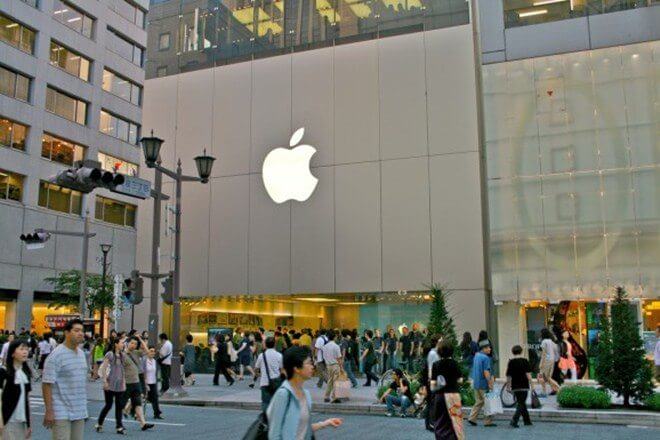Apple Inc. (NASDAQ:AAPL) is planning a bond sale in Japan, and it’s no wonder. Interest rates in the Pacific island chain are lower than almost anywhere else in the world. Abenomics, the program of fiscal and monetary reforms being pushed by current Japanese Prime Minister Shinzo Abe, is the direct cause of that. Tim Cook and Carl Icahn couldn’t be happier for his efforts.
The bonds, which will be the first yen issues ever sold by Apple, will total ¥200 billion, or $1.6 billion, according to a Wall Street Journal report.
Abenomics drives Apple decision making
Shinzo Abe met with Apple CEO Tim Cook earlier this week and Apple has affirmed a strong commitment to Japan in recent months. Apple may have broad expansion plans in Japan as the country’s economy gets moving on the back of sweeping reforms known globally as “Abenomics.”
Large-scale printing of money and low rates on debt are common around the world, but Japan is coupling that with a series of legal reforms and a fiscal expansion. Abe is looking to get inflation to 2% and the central bank will print money until it gets there.
At the start of May the state showed that prices rose by 0.2%, far from that target. That is a good sign for Apple, however. The lower inflation is the more likely rates stay low for longer.
Apple may be set to use the Japan bond issuance to pay for operations and expansion in the country. Tim Cook announced a new research site near Yokohama last year, and may be planning even more investment.
Apple looks for low rates around the world
As the Fed looks to raise interest rates in the US, Apple is keen to take advantage of low rates around the world. The Japan issue comes hot on the heels of a Swiss franc bond sold by the firm earlier this year.
In February Apple sold the two part bond to Swiss investors. That deal raised 1.25 billion Swiss francs ($1.35 billion).
Moody’s has a rating of Aa1 on Apple debt. That’s the second highest rating the firm gives out, and it puts Apple just behind the likes of Germany in terms of default risk.
The Swiss issue was the first for the company, but it is clear that that bond could have been the first of many. Apple is now running a massive share buy-back that relies on low rates in order to be worth the cash it sucks up.
Apple has a lot of cash in Europe, but relatively little in the US, and it will need to keep raising capital to pay for that return plan.
That means that global debt sales may become more common in the years ahead. There are currency risks with such actions, however. If the firm isn’t careful, it may end up footing the bill for moves made by Mario Draghi, Janet Yellen or one of the other among the group of bankers that controls world money supply.
Click here to learn more about best forex brokers.
Trusted & Regulated Stock & CFD Brokers
What we like
- 0% Fees on Stocks
- 5000+ Stocks, ETFs and other Markets
- Accepts Paypal Deposits
Min Deposit
$200
Charge per Trade
Zero Commission on real stocks
64 traders signed up today
Visit Now67% of retail investor accounts lose money when trading CFDs with this provider. You should consider whether you can afford to take the high risk of losing your money.
Available Assets
- Total Number of Stocks & Shares5000+
- US Stocks
- German Stocks
- UK Stocks
- European
- ETF Stocks
- IPO
- Funds
- Bonds
- Options
- Futures
- CFDs
- Crypto
Charge per Trade
- FTSE 100 Zero Commission
- NASDAQ Zero Commission
- DAX Zero Commission
- Facebook Zero Commission
- Alphabet Zero Commission
- Tesla Zero Commission
- Apple Zero Commission
- Microsoft Zero Commission
Deposit Method
- Wire Transfer
- Credit Cards
- Bank Account
- Paypall
- Skrill
- Neteller
What we like
- Sign up today and get $5 free
- Fractals Available
- Paypal Available
Min Deposit
$0
Charge per Trade
$1 to $9 PCM
Visit Now
Investing in financial markets carries risk, you have the potential to lose your total investment.
Available Assets
- Total Number of Shares999
- US Stocks
- German Stocks
- UK Stocks
- European Stocks
- EFTs
- IPOs
- Funds
- Bonds
- Options
- Futures
- CFDs
- Crypto
Charge per Trade
- FTSE 100 $1 - $9 per month
- NASDAQ $1 - $9 per month
- DAX $1 - $9 per month
- Facebook $1 - $9 per month
- Alphabet $1 - $9 per month
- Telsa $1 - $9 per month
- Apple $1 - $9 per month
- Microsoft $1 - $9 per month
Deposit Method
- Wire Transfer
- Credit Cards
- Bank Account



